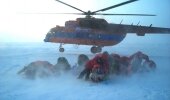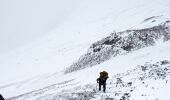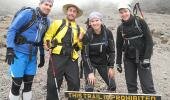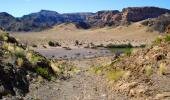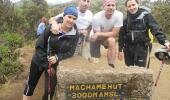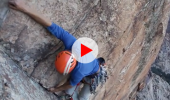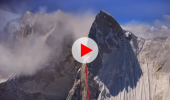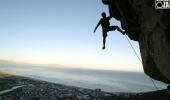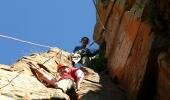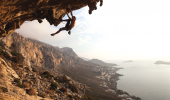Words by Braam Malherbe | Photos by Paul van Schalkwyk / Urban Brew
I'm sitting on an old camping chair under a tall old Oak Tree at my cabin in the Cederberg Mountains. I planted this tree myself, around 30 years ago, and it provides some much needed shade and relief from the sweltering 42°C heat.
Photo credit: Paul van Schalkwyk / Urban Brew
I recently returned from what must have been the hardest challenge of my life, and I am no stranger to difficult, often considered crazy and impossible expeditions. I spent six weeks in Antarctica, at temperatures of below minus 50°C, and completed a 760km race held for the centenary celebration of Amundsen and Scott’s first expedition to the South Pole.
Being back in Africa is almost as unreal as it was to be there; the most hostile place on the planet that’s so cold and dry that not even bacteria can survive, and the surface of the up to 4000m thick ice sheet that covers the continent is literally sterile. It is not a place any sensible living being would elect to go to, let alone spend weeks travelling on foot, sleeping in a tent and pulling a 70kg sled. Yet this is exactly what my great friend Pete Van Kets and I did over our 2011/2012 Christmas and New Year holidays.
We had been invited to be one of seven teams, from six nations, to represent our country at the Scott-Amundsen Centenary Race to the Pole; an unsupported race organised by Extreme World Races. The other three-man teams came from Norway, the United Kingdom (2), Ireland, Germany and Holland. Having teams of three was a safety requirement, but Peter and I just didn't have enough time to find a third person and were given special permission to enter as a two-man team. So despite the fact that neither of us had any cross-country skiing experience and had hardly spent a week in sub-zero temperatures in our entire lives, we couldn’t pass up this adventure.
Besides that, I have always had a deep love and connection to our planet's last refuges of pristine wilderness, untouched and unaltered by our ugly human influence and exploitation. With Antarctica being the most remote and least populated continent on Earth, what better place to take a stand against our all-consuming greed and consequent environmental destruction?
Our preparations were haphazard and last minute. Our 'training' consisted of a 10-day trip to Iceland with the race organisers and other teams, of which two days were spent indoors due to bad weather and then a few days of skiing across a prepared glacier piste in the French Alps.
With both of us significantly older than the other contestants, and inarguably the least experienced in snow and ice, we christened our sleds after the Jamaican bobsleigh team's sled at the Olympics and hoped for the best. Besides the conviction and belief in our cause of highlighting the plight of the environment, our age and sense of humour were, it turned out, the two factors that worked in our favour in the weeks of stark, glaring, frozen whiteness that followed.
Landing at Novo Base in Antarctica, after emotional goodbyes at Cape Town International Airport and a six-hour flight in a windowless Russian cargo plane, was mind blowing. There truly still is a place on Earth that humans have not been able to conquer and subdue, where the elements are so forbidding that a few weeks in summer are the only times when planes are able to land and people can visit before it is once again plunged into months of otherworldly cold and perpetual darkness, and that has until now remained nationless.
We spent 10 days trying to acclimatize to the cold weather conditions and altitude on the Antarctic plateau before being flown to the start line of the race at 83 degrees. Obviously this is some sort of a euphemism - who could ever expect two born and bred Africans to 'acclimatize' to a wind chill of minus 50°C?
Shortly after the start, and only a few days into the race, we learnt that some of the other teams weren’t doing too well. Marc, a member of the British Team Green, had come down with a serious case of bilateral pneumonia and had to be emergency evacuated and airlifted back to Cape Town. Apparently it was so serious that he wouldn’t have lasted another hour if his teammate hadn’t called for help. This news didn’t exactly boost my confidence, as I was also suffering from cold- and altitude-induced bronchitis and subsequently lay awake for three consecutive nights coughing, vomiting and gasping for air. We heard that another team also had to give up due to acute health problems. At that point both of us hadn’t slept for two nights and it looked like the elements and exhaustion were getting the better of us. We were very worried and contemplated resting in our tents for a day. Dying out here was a real threat in the back of our minds and doubts started eating away at our resolve. But then I remembered why I was actually here; it was not to visit and see this strange and unusual place, nor was it the adventure or to compete in this race to try and win and bolster my ego. I was here because of my passion for the Earth, which I have always considered to be a sort of living being, and the beauty and amazement I find in nature. Few people actually realise what we have done to our planet over the last few decades. One needs to step back and consider the whole; the impact we have made on a planetary scale. As a single species out of millions, maybe billions, which have shared the Earth with us over geological time, no life form since the first bacteria and plants has altered the chemistry and face of our common home quite as drastically and fast as we have. And not for the better either!
Great examples to illustrate this point are our ubiquitous plastic waste, vast expanses of which, visible from space, cover significant parts of all of the Earth’s oceans, and the ozone hole. I came across both of these even in Antarctica, the most remote place on the planet. It really does stare us in the face; yet we are still mostly blind to it. And that was the reason I went on this trip, as an ambassador not for our country, but for our planet and to publicise this race against time we, as a species, find ourselves in if we want to carry on inhabiting this world.
And so we carried on. We reached the South Pole after 24 days of icy, white hell, fighting sensory deprivation, thin air, frost bite and losing over 12kgs each. We went on to overstrike 1000 commemorative coins from the SA Mint at the South Pole, which will be auctioned off in Berlin later this year, depicting the Antarctic continent and serving as a warning and symbol for the fight against climate change and environmental destruction.
We ended up being the last of only three teams that completed the race, having aided the second British team in to reach the Pole after one of their members fainted from weakness, broke an arm and could not continue pulling his sled, a few days from the finish.
our ordeal reconfirmed one of my most deeply held beliefs; that the human spirit is capable of forcing the body to accomplish just about anything, despite pain, desperation and vanishingly small chances of success. But my guess is that this is exactly what we’ll need in the next few years and decades to win our global race against time; to survive, make good for our sins and leave behind a sustainable world for our successors.
